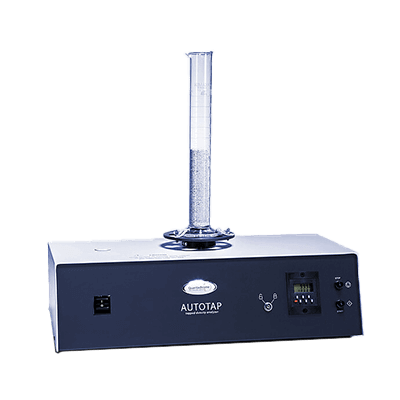What Is a Density Meter?

A density meter is a device that measures the density of a liquid or solid. Density is a value that varies depending on the sample concentration and the type of solvent, and density measurement is used in a variety of industries. Density measurement methods include vibrating densimeters for liquids and pycnometers for solids.
Density measurements are highly repeatable and can be made to 3-5 decimal places (g/cm3). Hand-held density meters are also available, which are less accurate than regular bench-top density meters, but are highly portable and can be used to make digital measurements on site. There are also process density meters (online density meters) that are attached to pipes and continuously measure liquid density.
Measuring Density With a Density Meter
Density meters are used in various industries to measure the density of binary liquid mixtures because density values are closely related to concentration.
For example, a prescribed analytical method for measuring alcohol concentration stipulates the use of a density meter. In addition to ethanol, the density meter can also be used for IPA, hydrochloric acid, sulfuric acid, sodium hydroxide, acetone, NMP, gasoline, diesel fuel, lubricating oil, refrigerants, beer, sugar (Brix), etc., making it suitable for use in any industry, including chemical, petroleum, food, beverage, semiconductor, battery, and automobile.
There are also density meters that can be used to measure not only liquid density but also solid density such as slurry, but it is necessary to confirm that the device is compatible.
Principle of Liquid Density Measurement
The measurement method of digital density meters for liquids is standardized, this method is also registered by ASTM, DIN, etc. as an oscillating density measurement method using a U-tube.
It should be noted that some density meters use this method, while others use their method to correlate with the values of vibrating densimeters.
Density measurement is also possible with Coriolis mass flowmeters, but since these are different from vibrational density meters, it is necessary to select the appropriate device for the purpose in advance.
Solid Density Measurement
Solid density measurement is used in research, development, and quality control efforts in a variety of industries. One of these techniques is used as an internationally recognized test method. Many of the standard test methods described for solid density measurement were created around these instruments.
These test methods are used in all industries today. Tap density meters, gas pycnometers, and other methods should be selected to suit the purpose. It is also necessary to check for compliance with many measurement methods, such as ASTM, ISO, UOP, USP, MPIF, and JIS.
Simultaneous Measurement With Other Physical Property Values
Density values are so common that they are measured in many fields, and in such cases, they are measured simultaneously with other physical properties.
In a liquid density meter, for example, a sample is injected into a U-tube inside the instrument. By introducing the sample from the density meter into a refractometer or similar instrument, multiple items can be measured in a short period. Not only does it work well in laboratories where efficiency is required, but it can also perform complex analyses by using multiple parameters.
This includes a three-component analysis and calculation of volumetric modulus. This can be done with a bench-top density meter or a process density meter.
Points to Keep In Mind When Making Measurements
Density measurement is performed with a fixed amount of sample in the device, so if bubbles or impurities are present, they will be included in the measurement. In the case of liquids and slurries, air bubbles must be removed without fail.